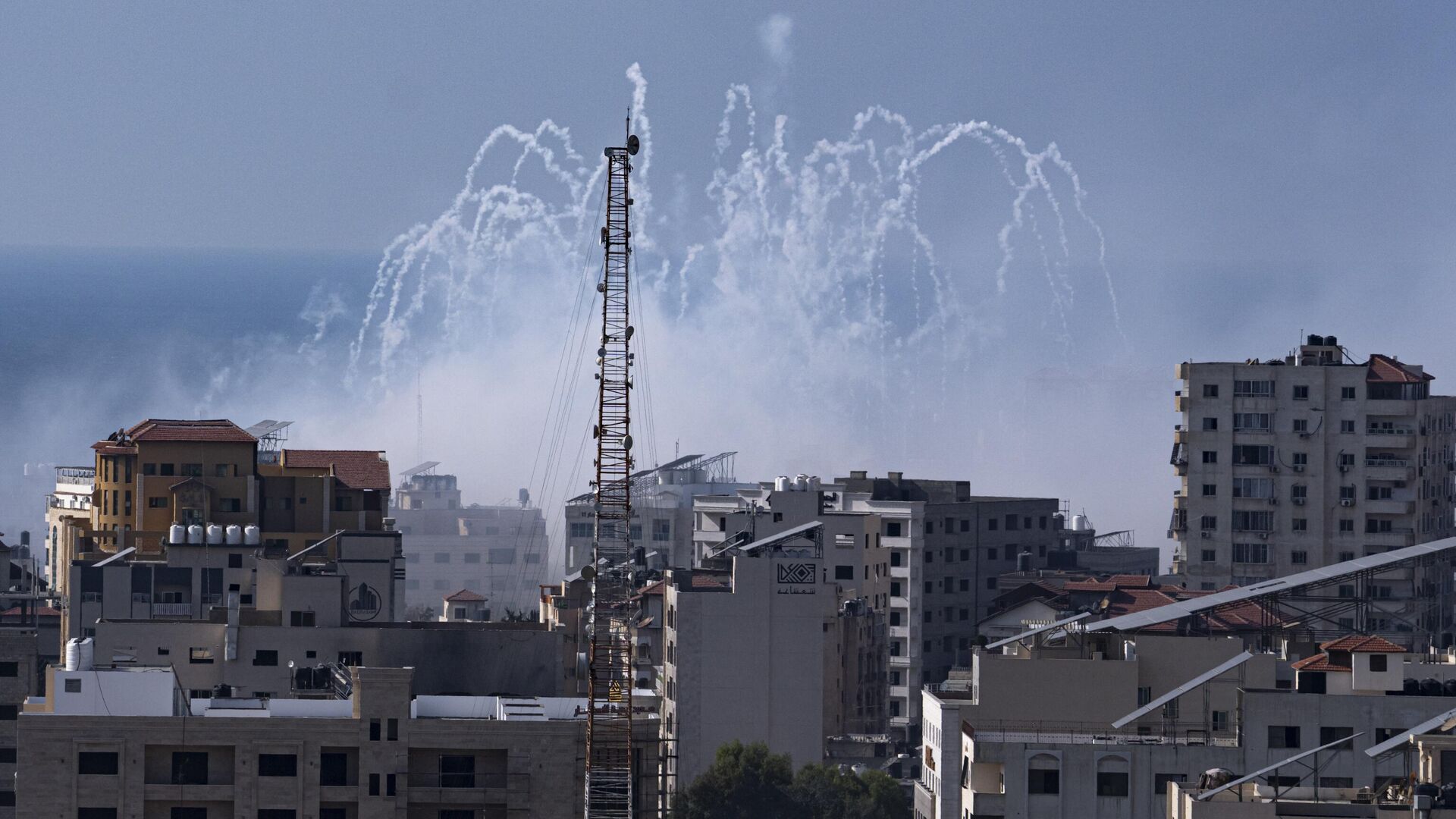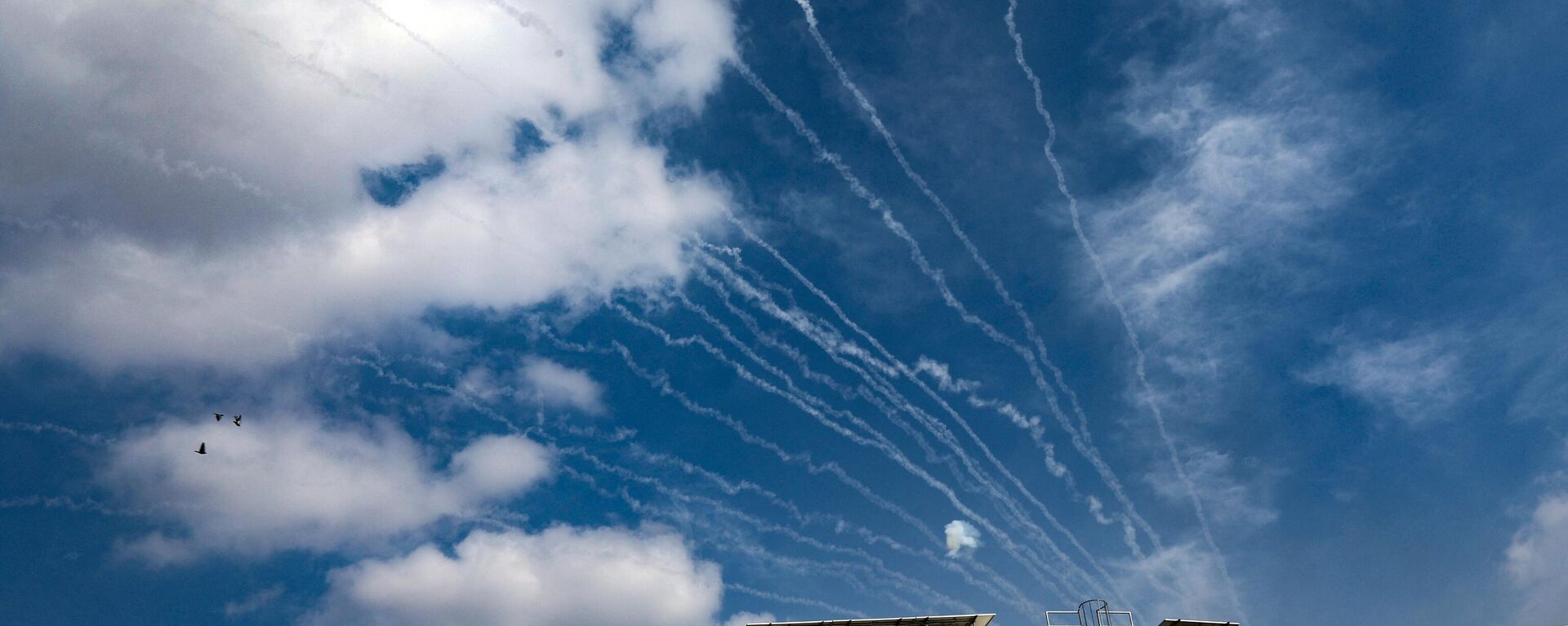India Realises Need For Balance on Israel-Palestine Issue: Experts
18:06 27.10.2023 (Updated: 14:03 31.10.2023)

© AP Photo / Fatima Shbair
Subscribe
Many supporters of PM Modi have backed Israel's response to the deadly terrorist attack by Hamas. Experts believe this pro-Israel stance challenges New Delhi’s longstanding solidarity with Palestine.
There is a growing sense of “realization” in the Indian leadership about the need to strike a balance in ties between Israel and the Arab countries since the 7 October attack by Hamas, a veteran Indian diplomat has told Sputnik India.
“My understanding is that there has been a realization in India that it cannot afford to be aloof from such a significant global issue that the current crisis has become. So, there must be a semblance of degree of involvement,” said Ambassador Talmiz Ahmad, a former Indian Ambassador to Saudi Arabia, Oman and the United Arab Emirates (UAE).
The first Indian response to the 7 October attack by Hamas against Israel was a social media post by Prime Minister Narendra Modi expressing “solidarity” with the people of Israel in the face of the “terrorist” attack by Hamas.
Modi subsequently spoke to Israeli Prime Minister Benjamin Netanyahu over a call on 10 October, stating that Indians stood with Israel in the “difficult hour”. Any reference to Palestine or a two-state solution were missing from these initial statements by the Indian PM, a point not lost on observers and Indian opposition parties.
Subsequently, India’s Ministry of External Affairs (MEA) reaffirmed New Delhi’s longstanding position of supporting a “sovereign and independent” Palestine, five days after the Hamas attack.
The Indian Prime Minister has since spoken to Palestinian Authority President Mahmoud Abbas, reiterating New Delhi’s “longstanding principled position on the Israel-Palestine issue,” according to a social media post by Modi on 19 October.
New Delhi also announced this week that it has dispatched nearly 38 tonnes of humanitarian assistance to Gaza in recent weeks.
On 23 October, Modi spoke to Jordan’s King Abdullah, calling for facilitating an “early resolution” of the crisis. The conversation was held amid growing global calls for a ceasefire in the face of the mounting toll of Palestinians killed in Israeli Defense Forces (IDF) strikes on Gaza.
According to the Gaza Health Ministry, over 7,000 Palestinians have been killed in IDF’s retaliatory strikes since the 7 October attack. The Palestinian death toll is already five times the number of Israelis killed during the Hamas attack.
Has Modi’s Stance on Israel Shifted?
Ahmad said that the slight change in India’s stance towards Israel over the last three weeks was due to the fact that New Delhi’s position on the matter had been different from that adopted by other Global South nations as well as BRICS countries.
Most of the non-western powers, including Russia and China, have been vocal in expressing solidarity with the Palestinian cause. Both the BRICS partners of India have also backed a UN Security Council (UNSC) resolution calling for an immediate ceasefire in Gaza, which was vetoed by the US.
While Russian President Vladimir Putin has condemned the Hamas attack against Israel, he has also stated that the fight against terrorist couldn’t be “conducted on the notorious principle of collective responsibility”.
“Just last month, we proclaimed to the world at the G20 Summit that we are the voice of the Global South. But that voice isn’t being heard anywhere,” stated Ahmad, also highlighting that New Delhi has traditionally been a major backer of the Palestinian cause.
“The whole Global South has been supporting the Palestinian cause and India is nowhere to be seen,” the former diplomat reckoned.
Ahmad said that the need of the hour was a “strong a statement in public domain” calling upon Israel to immediately implement a ceasefire.
Support for Israel in India
In spite of the Indian Prime Minister seeking to strike a balance in ties between Israel and Palestine, Modi’s core supporter base of Hindu nationalists seems to be firmly behind Israel in its fight against “terrorism”.
Nilanjan Mukhopadhyay, the author of Modi’s biography ‘Narendra Modi: The Man, the Times’, told Sputnik India there had been a “very concerted effort” on part of the Hindu nationalistic parties in India to enhance relations with Israel in the last three and a half decades.
Mukhopadhyay said that, at the same time, India’s ‘Sangh Parivar’ had been advocating to “moderate” India’s traditional support for Palestine.
He said that there used to be a “genuine belief” among Indians that the Palestinian cause was an honourable cause, a perception which seems to have eroded under the current Indian political dispensation.
Opposition to Pro-Palestine Solidarity
Vinod Bansal, the spokesperson for VHP, told Sputnik India that those Muslim groups and political parties which have been holding protests in support of Palestine were “disparaging” the Islamic faith.
Top Indian Muslim organizations have condemned Israel in the wake of recent escalation of hostilities in the Middle-East. Some regional groups such as Social Democratic Party of India (SDPI) and All India Majlis-E-Ittehadul Muslimeen (AIMIM) have even been taking out street protests condemning Israel and even calling for boycott of Israeli products in India.
“Why aren’t these groups even ready to condemn the terrorist attack by Hamas? Is it justified to kill innocent civilians,” questioned Bansal.
Palestine 🇵🇸 #IndiaWithPalestine #Palestine #India #FreePalestine #PalestineWillBeFree pic.twitter.com/SB9qi45BiO
— Asaduddin Owaisi (@asadowaisi) October 23, 2023
Bansal further expressed concern that certain political parties have been whipping up emotions over the Israel-Palestine dispute.
“Of course, we are seeing a religious polarization happening here. But this is a very dangerous tactic,” Bansal warned, without elaborating further.
Around 80 percent of the Indian population is Hindu, while Muslims comprise some 15 percent of the population, according to last Census findings in 2011.
Criticality of Arab World for India
Analysts point out that the Arab countries are strategically important for India on multiple accounts, including economically and from the perspective of energy security.
Over 35 percent of India’s energy imports last month were sourced from Saudi Arabia and Iraq, according to data by Vortexa cited by Reuters.
Importantly, the Gulf Cooperation Council (GCC) nations have consistently ranked as top source of remittance for India, as they host a large contingent of blue-collar and white-collar Indian workers.
Around 30 percent of India’s overall remittances from overseas in 2021 came from the GCC, with Saudi Arabia and the UAE leading the top source of remittances.
The UAE and Saudi Arabia are also among India’s biggest trading partners, making them critical for Indian interests.


